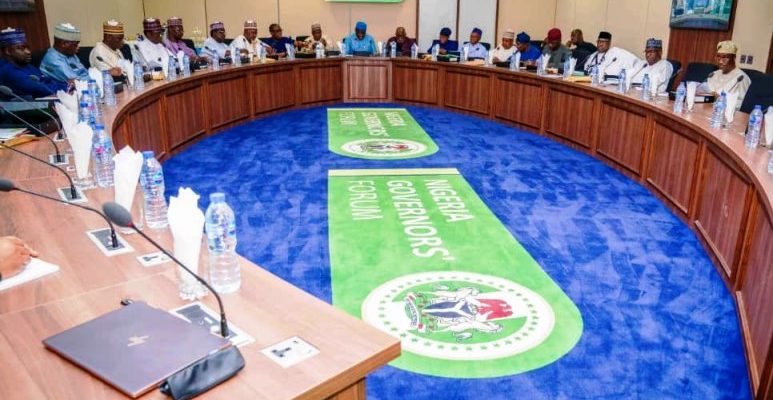Telecom companies and the National Identity Management Commission (NIMC) will be playing a critical role in 33-point recommendations made by state governors under the aegis of the Nigeria Governors’ Forum (NGF) to President Muhammadu Buhari to save the economy from collapse.
The governors have asked Abuja to introduce a flat 3% Federal Personal Income Tax (FPIT) on all Nigerians earning more than N30,000 per month to beef of the national treasury with about N100 billion as part of efforts to rescue the country from financial blights.
The recommendations also proposed that Nigerians earning less than N30, 000 per month, whether employed or not, including farmers and traders be made to pay a monthly FPIT of N100.
The proposal advised that telecom companies and the National Identity Management Commission (NIMC) should collaborate to ensure deduction of this from phone credit of individuals linked to National Identification Number (NIN) and Bank Verification Number (BVN).
The governors expressed worries that national earning has continue to dip fearing its negative impact across sectors could further worsen the state of affairs. They want President Buhari to regard the 30 recommendations as urgent measures to save the economy and stir Nigeria towards a new path of growth as the 2023 elections draw near.
Below is a comprehensive list of the containing the 2022 estimated savings expected from the implementation of the proposed measures.
Premium Times has published a comprehensive list of the measures. See below.
- Reduce FGN expenditure immediately (with estimated savings in 2022 in brackets):
- Eliminate PMS subsidy/under-recovery – (N6-7 trillion)
- Eliminate NNPC’s Federation-funded projects – (N300 billion)
- Cap Social Investment Program (SIP) and National Poverty Reduction with Growth Strategy (NPRGS) budgets to N200 billion – (N570 billion)
- Eliminate extra-constitutional deductions from FAAC – (N100 billion)
- Reduce SWV items for SDG and NASS Constituency projects – (N300 billion)
- Reduce duplications (e.g. empowerment programmes) and waste – (N100 billion)
- Reduce 1 percent granted to NASENI to 0.2 percent. Amend the Act in the 2022 Finance Bill.
- Reduce Personnel Costs of FG MDAs:
- Offer federal civil servants above 50 years (a) one-off retirement package to exit the service – (N350 billion), and employ lower-cost, more ICT-compliant youths and women graduates.
- Begin implementation of the updated Stephen Oronsaye Report – (N1 trillion)
- Expedite privatization of non-performing assets. (Billions of Naira)
- 2023 – 2025 MTEF to be revised and updated to reflect above expenditure management measures and Government’s commitment to restore fiscal discipline.
- Planned 22 per cent increase in salaries in 2023 to be reconsidered.
- Reduce fiscal deficit to no more than 2 per cent of GDP in 2023 – 2025.
- Foreign trips by MDAs, including budgetary-independent agencies such as CBN, FIRS, NPA, NIMASA and NCC, etc. to be put on hold for at least one year.
- Ministry of Foreign Affairs not to issue requests for Visas to foreign embassies for FGN officials and their families, unless express approval is granted by the Presidency.
- Move from State Income Taxation to Consumption Taxation:
- With the introduction of 3 per cent Federal Income Tax, state-level PIT should be abolished.
- State Sales Taxes (flat rate of 10 per cent) should be enacted for the 36 States and FCT.
- Increase VAT levels to 10 percent with a timeline to raise it to between 15 percent and 20 percent.
- Ensure re-introduction and passage of VAT into the Exclusive List.
- End CBN financing of FGN expenditures and convert the N19 trillion Ways and Means outstanding into 100-year, 1 per cent bonds immediately.
- Introduce a flat 3 per cent Federal Personal Income Tax on all Nigerians earning more than N30,000 per month. – (N100 billion)
- Persons earning less than N30,000 per month whether employed or not, including farmers and traders should pay a monthly FPIT of N100.
- Telecom firms and NIMC should collaborate to ensure deduction of this from phone credit of individuals and linking to NIN and BVN.
- Centralize the collection of all federal oil and non-oil taxes in one agency, the FIRS while Customs, NPA, etc assess and issue demands.
- Improve offshore crude oil and gas production.
- Resolve lingering issues of ownership of gas in PSCs (eg Nnwa-Doro, OML 129). This will help position Nigeria to take advantage of the gas needs in Europe.
- Provide incentives and resolve issues to expedite development of vandalism-resistant deep offshore fields like Bonga SW (Shell), Preweoi (Total), Zabazaba (ENI) and Owowo (Exxon).
- Encourage (and pre-finance, if necessary) Dangote Refinery to early completion to reduce massive future outflows of foreign exchange.
- Central Bank of Nigeria
- The Bank of Agriculture, Bank of Industry, and Development Bank of Nigeria should be recapitalised
- Funds in NIRSAL controlled by CBN should be redirected to the Development Banks.
32: CBN should be directed to focus on its core and statutory mandate of exchange rate management, interest rate management and inflation targeting. It should also be directed to cease competing with development and commercial banks.
- CBN’s subsidized interventions in the real sector should be ended and the relevant institutions recapitalized to provide these services.
COVER IMAGE Courtesy: Premium Times
































